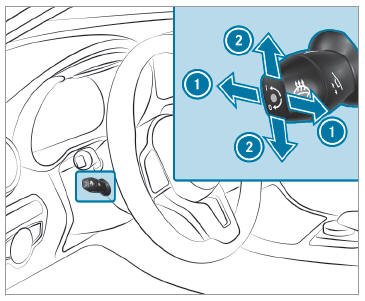Mercedes-Benz GLC : AIR BODY CONTROL / AIR BODY CONTROL function
NOTE Mercedes-AMG vehicles
Observe the notes in the Supplement. You could otherwise fail to recognize dangers.
AIR BODY CONTROL is an air suspension system with variable damping for improved driving comfort. The all-round level control system ensures the best possible suspension and constant ground clearance, even with a laden vehicle. When driving at speed, the vehicle is lowered automatically to improve driving safety and to reduce fuel consumption. You also have the option of manually adjusting the vehicle level.
AIR BODY CONTROL includes the following components and functions:
- Air suspension with variable spring rate
- Automatic level control system
- Speed-dependent lowering to reduce fuel consumption
- Manually selectable high-level setting for greater ground clearance
- ADS PLUS (Adaptive Damping System with constant damping force adjustment)
- DYNAMIC SELECT switch and level button
Suspension setting and vehicle level per drive program
- Drive program
 :
: - The suspension setting is comfortable.
- The vehicle is set to the normal level.
- When driving at speeds above approximately 86 mph (138 km/h), the vehicle is lowered.
- When driving at speeds below approximately 50 mph (80 km/h), the vehicle is raised again.
Drive program  :
:
- The suspension setting is comfortable.
- The vehicle is set to low level -1.
- The vehicle is not lowered any further if you are traveling at higher speeds.
Drive program  :
:
- The suspension setting is firmer.
- The vehicle is set to low level -1.
- The vehicle is not lowered any further if you are traveling at higher speeds.
Drive program  :
:
- The suspension setting is even firmer.
- The vehicle is set to low level -1.
- The vehicle is not lowered any further if you are traveling at higher speeds.
Drive program  and
and
 :
:
- The suspension setting is suitable for offroad terrain.
- The vehicle is set to high level +1.
- When driving at speeds above approximately 75 mph (120 km/h), the vehicle is lowered.
- When driving at speeds below approximately 50 mph (80 km/h), the vehicle is raised.
Individual suspension settings can be called up
in drive program  .
.
Operation with a trailer or bicycle rack: if
transport equipment, such as a trailer or a
bicycle rack, is attached to the trailer hitch
and the electrical connection has been correctly
established, the vehicle remains at
normal level in drive programs  ,
,
 ,
,
 and
and
 , irrespective of speed.
, irrespective of speed.
Differences between different vehicle levels compared to the normal level (0):
- High level +2 (only vehicles with Off-road package): approximately +2.0 in (+50 mm)
- High level +1: approximately +1.2 in (+30 mm)
- Low level -1: approximately -0.6 in (-15 mm)
 Setting the vehicle level
Setting the vehicle level
WARNING Risk of accident because
vehicle level is too high
Driving characteristics may be impaired.
The vehicle can drift outwards, for example,
when steering or cornering...
Other information:
Mercedes-Benz GLC 2016-2026 Owners Manual: Switching the rear window wiper on/off
Wipes with washer fluid Switches on intermittent wiping Switches off intermittent wiping Wipes with washer fluid Turn switch to the correct position - . The symbol will appear on the instrument cluster when the rear window wiper is switched on...
Mercedes-Benz GLC 2016-2026 Owners Manual: Activating or deactivating the child safety lock for the rear doors
WARNING Risk of accident and injury due to children left unattended in the vehicle If children are left unsupervised in the vehicle, they could, in particular: open doors, thereby endangering other persons or road users. get out and be struck by oncoming traffic...



 To adjust the distance to the
steering wheel
To adjust the distance to the
steering wheel